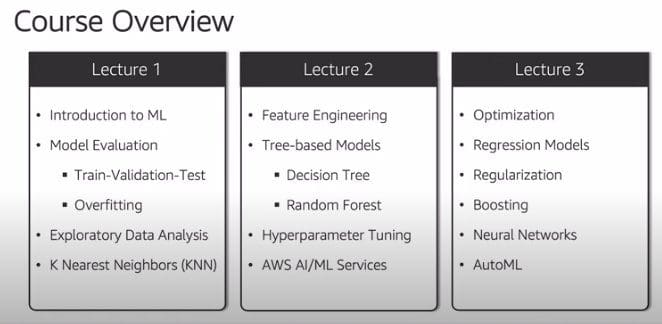 Free Introductory Machine Learning Course From Amazon
Free Introductory Machine Learning Course From Amazon
Amazon's Machine Learning University offers an introductory course titled Accelerated Machine Learning, which is a good starting place for those looking for a foundation in generalized practical ML.

We have recently shared introductory courses from Amazon's recently-launched Machine Learning University initiative, courses focusing on both computer vision (CV) and natural language processing (NLP). These courses assume no previous knowledge of the topics, and are based on short video lectures and corresponding Python notebooks.
But what if you are not interested in the specialized paths of either CV or NLP? What if you would like to gain an understanding of applying machine learning to more traditional datasets? If this remark resembles you, Accelerated Tabular Data from Amazon's Machine Learning University might be a good place to start.
The course is taught by Paula Grajdeanu, a Technical Training Specialist with Amazon, and covers the following mateiral:

The course lectures can be found in the course's YouTube playlist, while the accompanying materials — including slides, notebooks, and datasets — can be found in the course GitHub repository. The final project, keeping with the course's goals of emphasizing practical skills, is based on pet adoption data from Austin Animal Center.
Why even mention "tabular data"? That's because the course is not designed to teach the theory behind the latest state of the art deep learning, but Accelerated Tabular Data will give you an introduction to using a variety of techniques to implement machine learning solutions on tabular data — that is, data which is stored alphanumerically in rows and columns, with rows representing observations, and columns representing features of these observations. This contrasts with techniques for other types of data, namely computer vision and natural language processing, the learning of which complementary courses from Amazon MLU can build upon.
The course isn't designed to be exhaustive, but to instead whet your appetite with practical machine learning. See the course topics above, and think of it as a sampler of what is out there, and what you could choose to focus on afterwards.
You won't be engineering production-ready machine learning systems after this introductory course, but it should provide you with a survey of what you could accomplish practically with machine learning, give you the necessary tools to cover some of these tasks, and help point you in a direction of more in-depth learning when complete. All in all, this course looks like a good place for some to consider starting their machine learning path.
Related:
- Accelerated Computer Vision: A Free Course From Amazon
- Accelerated Natural Language Processing: A Free Course From Amazon
- Going Beyond Superficial: Data Science MOOCs with Substance

 Free Introductory Machine Learning Course From Amazon
Free Introductory Machine Learning Course From Amazon